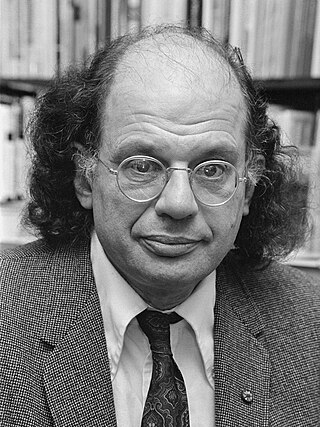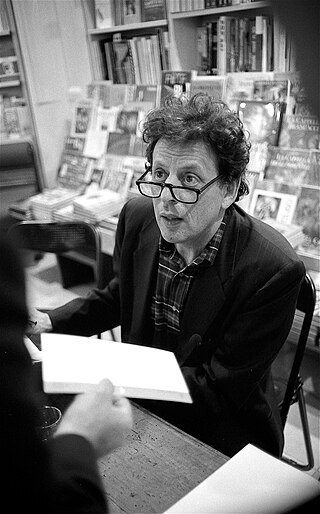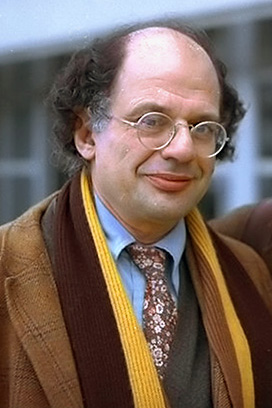
Irwin Allen Ginsberg was an American poet and writer. As a student at Columbia University in the 1940s, he began friendships with Lucien Carr, William S. Burroughs and Jack Kerouac, forming the core of the Beat Generation. He vigorously opposed militarism, economic materialism, and sexual repression, and he embodied various aspects of this counterculture with his views on drugs, sex, multiculturalism, hostility to bureaucracy, and openness to Eastern religions.

Philip Glass is an American composer and pianist. He is widely regarded as one of the most influential composers of the late 20th century. Glass's work has been associated with minimalism, being built up from repetitive phrases and shifting layers. Glass describes himself as a composer of "music with repetitive structures", which he has helped to evolve stylistically.
"Hadda be Playin' on the Jukebox" is a poem written by Allen Ginsberg in 1975. The "Hadda" of the poem is Hadda Brooks, the American pianist, vocalist and composer, who was billed as "Queen of the Boogie".

The Beat Generation was a literary subculture movement started by a group of authors whose work explored and influenced American culture and politics in the post-World War II era. The bulk of their work was published and popularized by Silent Generationers in the 1950s, better known as Beatniks. The central elements of Beat culture are the rejection of standard narrative values, making a spiritual quest, the exploration of American and Eastern religions, the rejection of economic materialism, explicit portrayals of the human condition, experimentation with psychedelic drugs, and sexual liberation and exploration.

"Howl", also known as "Howl for Carl Solomon", is a poem written by Allen Ginsberg in 1954–1955 and published in his 1956 collection Howl and Other Poems. The poem is dedicated to Carl Solomon.
The Philip Glass Ensemble is an American musical group founded by composer Philip Glass in 1968 to serve as a performance outlet for his experimental minimalist music. The ensemble continues to perform and record to this day, under the musical direction of keyboardist Michael Riesman.

The City Lights Pocket Poets Series is a series of poetry collections published by Lawrence Ferlinghetti and City Lights Books of San Francisco since August 1955.

Charles Plymell is a poet, novelist, and small press publisher. Plymell has been published widely, collaborated with, and published many poets, writers, and artists, including principals of the Beat Generation.

Solo Piano (1989) is an album of piano music composed and performed by Philip Glass. It was produced by Kurt Munkacsi.

The Fall of America: Poems of These States, 1965–1971 is a collection of poetry by Allen Ginsberg, published by City Lights Bookstore in 1973, for which Ginsberg shared the annual U.S. National Book Award for Poetry. It is characterized by a prophetic tone inspired by William Blake and Walt Whitman, as well as an objective view characterized by William Carlos Williams. The content is more overtly political than most of his previous poetry with many of the poems about Ginsberg's condemnation of America's actions in Vietnam. Current events such as the Moon Landing and the 1968 Democratic National Convention, the death of Che Guevara, and personal events such as the death of Ginsberg's friend and former lover Neal Cassady are also topics. Many of the poems were initially composed on an Uher Tape recorder, purchased by Ginsberg with the help of Bob Dylan.

Planet News is a book of poetry written by Allen Ginsberg and published by City Lights Bookstore in 1968. It is number twenty three in the Pocket Poets series. It contains poems written by Ginsberg between 1961 and 1967, many written during his travels to India, Japan, Europe, Africa, and many other places. Poems in this collection include:

Howl and Other Poems is a collection of poetry by Allen Ginsberg published November 1, 1956. It contains Ginsberg's most famous poem, "Howl", which is considered to be one of the principal works of the Beat Generation as well as "A Supermarket in California", "Transcription of Organ Music", "Sunflower Sutra", "America", "In the Baggage Room at Greyhound", and some of his earlier works. For printing the collection, the publisher Lawrence Ferlinghetti, another well-known poet, was arrested and charged with obscenity. On October 3, 1957, Judge Clayton W. Horn found Ferlinghetti not guilty of the obscenity charge, and 5,000 more copies of the text were printed to meet the public demand, which had risen in response to the publicity surrounding the trial. Howl and Other Poems contains two of the most well-known poems from the Beat Generation, "Howl" and "A Supermarket in California", which have been reprinted in other collections, including the Norton Anthology of American Literature.
The Prince Theater is a non-profit theatrical producing organization located in Philadelphia, Pennsylvania and specializing in music theatre, including opera, music drama, musical comedy and experimental forms. Founded in 1984 as the American Music Theater Festival by Marjorie Samoff, Eric Salzman and Ron Kaiserman, for the first 15 years AMTF performed in various venues throughout Philadelphia. In March 1999, AMTF moved into the renovated Midtown Theater and changed its name in honor of Broadway producer and director Harold Prince. AMTF/Prince Theater has produced 92 world premieres and has sent 81 productions to theaters in New York and worldwide.

"Everything Zen" is a single by British grunge band Bush. Released on 28 January 1995, it was the band's first single released under the name "Bush", and their second overall. The single comes from their 1994 debut album, Sixteen Stone.
"Three-Five-Zero-Zero" is an anti-war song, from the 1967 musical Hair, consisting of a montage of words and phrases similar to those of the 1966 Allen Ginsberg poem "Wichita Vortex Sutra". In the song, the phrases are combined to create images of the violence of military combat and suffering of the Vietnam War. In its first line, for instance, "Ripped open by metal explosion" is followed by "Caught in barbed wire/Fireball/Bullet shock".

"A Supermarket in California" is a poem by American poet Allen Ginsberg first published in Howl and Other Poems in 1956. In the poem, the narrator visits a supermarket in California and imagines finding Federico García Lorca and Walt Whitman shopping. Whitman, who is also discussed in "Howl", is a character common in Ginsberg's poems, and is often referred to as Ginsberg's poetic model. "A Supermarket in California", written in Berkeley about a market at University Avenue and Grove Street in that city and published in 1956, was intended to be a tribute to Whitman in the centennial year of the first edition of Leaves of Grass.
"Wichita Vortex Sutra" is an anti-war poem by Allen Ginsberg, written in 1966. It appears in his collection Planet News and has also been published in Collected Poems 1947-1995 and Collected Poems 1947-1980. The poem presents Ginsberg as speaker, focusing on his condemnation of the Vietnam War. It features imagery of the war and America's Heartland interspersed with news reports and cultural references. It is also written in Ginsberg's distinctive Whitman-like long-prose style.
Symphony No. 6, also known as the Plutonian Ode Symphony, is a symphony composed by Philip Glass. It is based on the poem Plutonian Ode by Allen Ginsberg, parts of which are sung by the soprano soloist in the work. The symphony was commissioned by Carnegie Hall in honor of Glass' 65th birthday and as a vehicle for the talents of soprano Lauren Flanigan. The symphony premiered on February 2, 2002, at Carnegie Hall with Dennis Russell Davies conducting the American Composers Orchestra. The symphony is in three movements, based on the three parts of the poem itself.

Charles Clement Fussell is an American composer and conductor of contemporary classical music. He has composed six symphonies and three operas. His symphony Wilde for solo baritone and orchestra, based on the life of Oscar Wilde and premiered by the Newton Symphony Orchestra and the baritone Sanford Sylvan in 1990, was a finalist for the 1991 Pulitzer Prize for Music. He received a citation and award from the American Academy of Arts and Letters in 1992.











